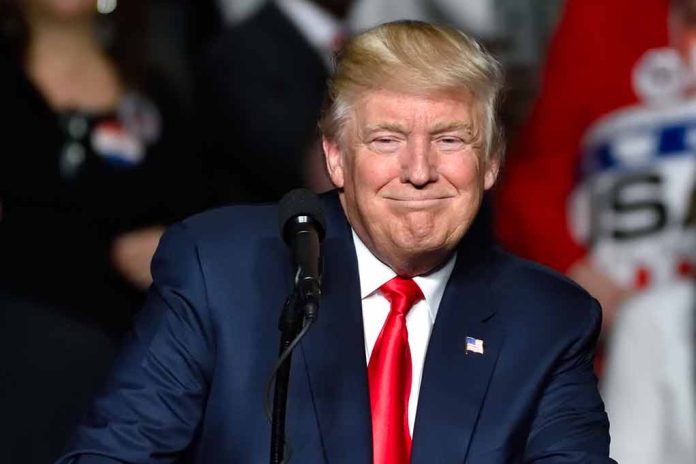
Donald Trump’s recent interview with The Wall Street Journal challenges claims about his mental decline, raising questions about age and leadership in politics.
At a Glance
- Trump’s 90-minute WSJ interview showed no signs of mental decline.
- Vice President Kamala Harris has criticized Trump’s age and mental state.
- WSJ found Trump more knowledgeable and confident than in 2015.
- Experts debate whether Trump’s speaking style indicates cognitive issues.
- Age and mental fitness remain contentious topics in presidential politics.
Trump’s Mental Acuity: A Contentious Debate
Former President Donald Trump’s mental acuity has been a subject of intense scrutiny and debate. Critics, including Vice President Kamala Harris, have repeatedly questioned his cognitive abilities, citing his age and unique speaking style. However, a recent 90-minute interview with The Wall Street Journal’s editorial board has challenged these assertions, painting a different picture of Trump’s mental state.
The Wall Street Journal’s report on the interview was notably positive, stating, “Lately Mr. Trump’s detractors have been speculating about his ‘mental decline.’ There’s no sign of such slippage in our Thursday meeting. The 2024 Trump seems more confident and is certainly more knowledgeable about policy than he was in 2015.” This assessment directly contradicts the narrative of cognitive decline that has been circulating in some political and media circles.
WSJ says NO SIGN Trump suffers from cognitive decline in the 90-minute interview he did with #WSJ — Trump more knowledgeable now. https://t.co/bGXaKgYN3d pic.twitter.com/pZHRwhOvru
— Stephanie Morgan (@FreedomMOM1776) October 21, 2024
Analyzing Trump’s Speaking Style
While the WSJ interview paints a picture of a mentally sharp Trump, some experts have raised concerns about changes in his speech patterns over time. Kathleen Hall Jamieson, a communications professor at the University of Pennsylvania, noted, “He’s more tangential.” Some analysts have observed an increase in Trump’s use of absolute terms and fewer positive words, which they suggest could indicate changes in cognitive ability.
However, Trump’s supporters and campaign team argue that his unique speaking style is intentional and part of his appeal to voters. They contend that media focus on Trump’s mental acuity is a distraction from what they perceive as more pressing concerns about Kamala’s ability to lead the nation.
The Age Factor in Politics
The debate over Trump’s mental fitness is part of a broader conversation about age and leadership in American politics. Vice President Kamala Harris has been particularly vocal on this issue, emphasizing the generational difference between herself and Trump. In a campaign statement, Harris claimed, “He’s becoming increasingly unstable and unhinged, and it requires that response.”
Interestingly, while Harris has been critical of Trump’s age and mental state, she has consistently supported President Biden, who faces similar scrutiny. This apparent contradiction highlights the complex and often partisan nature of discussions about age and fitness for office in American politics.
Historical Context and Voter Responsibility
It’s worth noting that concerns about age and mental fitness are not new in presidential politics. Past candidates like Bob Dole and Ronald Reagan faced similar scrutiny. The “Goldwater Rule,” which discourages psychiatrists from offering professional opinions without examination, further complicates public discussions of candidates’ mental fitness.
As the 2024 election approaches, voters are faced with the challenge of discerning between trivial incidents and behavior of real concern when evaluating candidates’ mental fitness. The contrasting assessments of Trump’s mental state, as seen in the WSJ interview and critiques from his opponents, underscore the importance of critical thinking and thorough evaluation in the electoral process.
Sources:
- WSJ Dismisses Attacks On Trump’s ‘Mental Decline’ After 90-Minute Interview
- Weekend Interview: Trump Tangles With the Journal’s Editors
- Trump’s rhetorical walkabouts: A sign of ‘genius’ or cognitive decline?






















